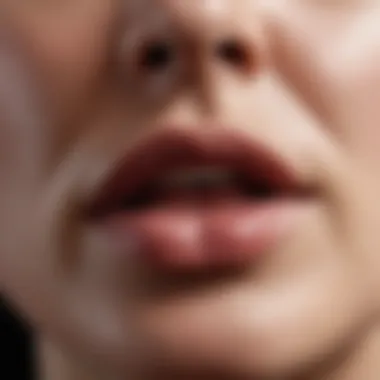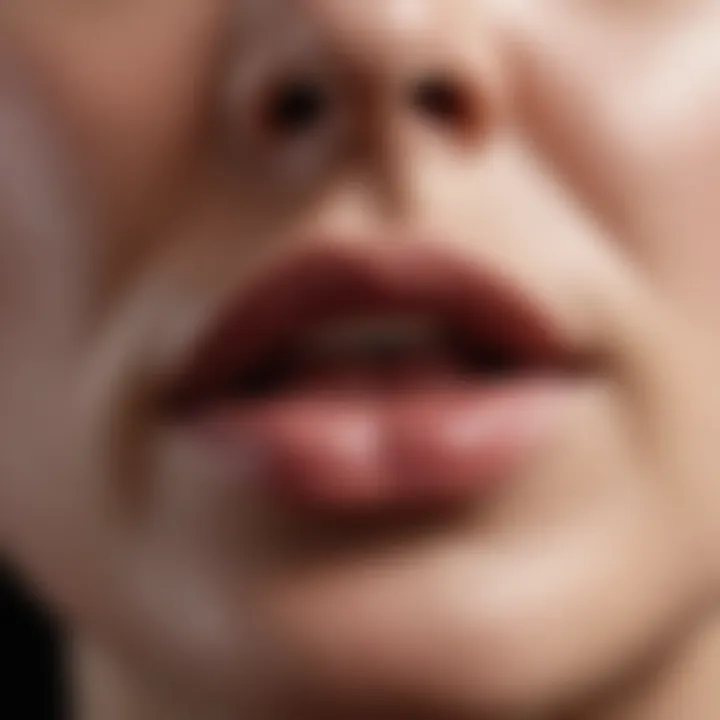Rapid Remedies for Faster Cold Sore Healing


Intro
Cold sores are an annoying reality for many. It’s like clockwork; the sun comes out, stress levels spike, or you catch a slight chill, and before you know it, that telltale tingle starts on your lip. For those who deal with the herpes simplex virus, understanding how to effectively speed up recovery is crucial. There’s much to unpack from medical intervention to natural remedies, and all that in between.
This article delves deep into various strategies for quicker healing. We aim to equip you with tools and knowledge to manage symptoms, prevent outbreaks, and ultimately enhance your recovery time. With a comprehensive perspective, let’s explore some effective methods.
Understanding Cold Sores
Understanding cold sores is crucial for anyone who has ever experienced those annoying blisters on their lips. These small yet bothersome lesions can not only be painful but also impact one’s self-esteem and social interactions. By grasping the underlying causes, we can tailor approaches that speed up recovery and lessen the chances of future outbreaks.
What Causes Cold Sores?
Cold sores are primarily triggered by the herpes simplex virus (HSV). It’s a sneaky little critter that often enters the body without much fanfare. Once you’ve been exposed, this virus rides out in nerve cells, waiting for the right moment to strike, which can be due to factors like stress, a weakened immune system, or even exposure to sunlight. More often than not, something as simple as a cold or flu can kick things off. Keeping an eye on these triggers can help you act fast the next time you begin to feel that tingle indicating a potential outbreak.
The Role of Herpes Simplex Virus
There are two types of the herpes simplex virus—HSV-1 and HSV-2. While HSV-1 is the primary culprit for cold sores occurring on the lips, HSV-2 commonly causes genital herpes. However, it's important to note that each type can potentially affect any area of the body. The way the virus works is rather meticulous. After the initial outbreak, it persists in your system, lying in wait until conditions favor its reactivation. This persistence explains why cold sores seem to pop up at the most inconvenient times.
Recognizing Symptoms
Being able to identify the early signs of a cold sore can be a game-changer for managing them effectively. The onset may start with a burning or itching sensation around the lips, often followed by the formation of small, fluid-filled blisters. As these blisters break open, they can crust over and heal within a week or two. Recognizing these symptoms early can allow one to use appropriate treatments to shorten the duration and ease the discomfort.
"Identifying the onset symptoms can significantly reduce recovery time and improve quality of life."
Knowing what you’re dealing with equips you to tackle it head-on. Regularly observing your body’s reactions and noting when these outbreaks occur is essential; it gives valuable insight into your own personal triggers and patterns.
Initial Actions Upon Outbreak
When you first feel that familiar tingling sensation on your lip, it’s crucial to swiftly determine the best course of action. This period is not merely a moment of annoyance; it is the onset of a cold sore, and making the right choices at this stage can significantly affect the duration and severity of the outbreak. Taking prompt action helps in lessening both the physical discomfort and the social anxiety that often accompanies such incidents. Being proactive during an outbreak is fundamental, as it paves the way for a quicker recovery and reduces the risk of further complications.
Identifying Triggers
Understanding what prompts your cold sores is almost like deciphering a personal code. Certain factors can send the herpes simplex virus into overdrive, and awareness of these can be the difference between a minor inconvenience and a major outbreak.
- Stress: Anxiety or heightened stress levels often serve as a major trigger. Whether it’s a stressful day at work or a personal issue, stress management should be a priority. Consider yoga, meditation, or even a brisk walk outside; movement can repair your mental state.
- Sun Exposure: Sometimes all it takes is a sunny day. UV rays can lead to cold sore flare-ups for many. Use lip balms with SPF as a preventive measure when you know you’ll be in the sun for a while.
- Hormonal Changes: For some women, menstrual cycles can bring about cold sore outbreaks. Being mindful of these patterns can help you prepare ahead of time.
- Diet: Certain foods, especially those high in arginine like chocolate and nuts, may also contribute to flare-ups in some individuals. Monitoring your diet can be a key strategy in controlling these outbreaks.
Recognizing these triggers not only prepares you for potential attacks but armors you against them.
Immediate Care Techniques
Once a cold sore begins to develop, immediate actions become paramount. You don’t need to sit idly while you await recovery; instead, you can employ a range of practical techniques to ease discomfort.
- Cold Compresses: Applying a cold compress can alleviate swelling and irritation. It’s as simple as wrapping ice cubes in a cloth and resting it on the sore. This soothing technique can relieve pain.
- Use of Antiviral Creams: If you have an antiviral cream such as Docosanol or Acyclovir on hand, apply it at the first sign of symptoms. It can significantly shorten healing time and reduce symptoms, provided it’s used early.
- Pain Relief: Over-the-counter pain relievers like ibuprofen or acetaminophen can manage discomfort effectively. Taking them at the earliest sign helps keep the pain at bay.
- Hydration: Staying well-hydrated supports your body’s healing functions. Drink plenty of fluids, as dehydration can worsen symptoms and prolong recovery.
- Avoiding Touching the Sore: Though it may be tempting to touch or pick at the cold sore, doing so can exacerbate the irritation and increase the risk of infection. Keep your hands away and encourage natural healing.
"Addressing a cold sore is much like dealing with a fire: you need to put it out quickly before it has a chance to fully ignite."
Implementing these immediate care techniques can stabilize the situation, ultimately leading to a quicker return to normalcy. Remember, the key lies in awareness and action.
Topical Treatments
When it comes to dealing with cold sores, topical treatments often take center stage. They can be a first line of defense, providing not just relief but also hastening the healing process. At the core, these treatments focus on the affected area, targeting the virus directly while promoting skin recovery. The choices can be vast, but having a clear understanding of your options is pivotal.
Over-the-Counter Options
For many people, over-the-counter treatments serve as a convenient way to combat cold sores. These products are easily accessible at pharmacies or online, making them appealing for those looking to treat an early outbreak or seek relief from discomfort.


- Lip Balms and Creams: Products containing benzyl alcohol or docosanol can help shorten healing time. They often provide a soothing layer over the sore, which is crucial when dealing with the burning sensation common in cold sores.
- Pain Relievers: Applying creams that contain lidocaine can address pain and discomfort, allowing one to carry on with their day without distraction.
- Topical Antivirals: Some gels and creams claim to halt viral replication. Look for substances like acyclovir; studies have shown these can reduce healing times significantly when used early in the outbreak.
In short, OTC options usually present the easiest, fastest remedies but require timely application for the best results.
Prescription Medications
When topical over-the-counter solutions don't cut it, or you're dealing with recurrent cold sores, prescription medications might be the way to go. Dermatologists often recommend these stronger options for a reason.
- Acyclovir Cream: A more potent form of treatment than its OTC counterparts, acyclovir can help reduce the duration and severity of symptoms. Working best when applied at the first sign of an outbreak, this medication is oftentimes a go-to for management.
- Valacyclovir: While primarily an oral medication, it can be prescribed alongside topical treatments to enhance effectiveness. This approach provides a dual mechanism to combat the herpes simplex virus from multiple angles.
- Penciclovir Cream: Another notable topical antiviral, this cream can also be helpful in treatment. It's particularly recommended due to its unique formulation, allowing for sustained drug release into the skin, thereby increasing effectiveness.
A prescription may seem more complex, but the payoff in effectiveness can often be a worthwhile investment when dealing with persistent outbreaks.
Choosing the Right Ointment
Selecting the right ointment can feel daunting, given the myriad of options available. Understanding your specific needs and preferences is critical in making the best choice.
- Evaluate the Severity: Consider how severe your symptoms are. For mild irritations, an OTC option may suffice, whereas more intense outbreaks might necessitate looking into prescription alternatives.
- Ingredients Matter: Pay attention to the active ingredients. Research indicates that topical treatments with antiviral properties tend to provide better outcomes, so consider those when choosing.
- Consultation: If you’re unsure which product is best for you, consult a healthcare provider. They can guide you based on your medical history and specific needs.
In the realm of topical treatments, finding the right fit can make a world of difference in managing and recovering from cold sores. Don’t just reach for the first tub in sight; take a moment to assess what will work best for your skin and situation.
"Choosing the right ointment is as much about understanding your skin as it is about the product itself."
Crafting a strategy that combines a topical treatment tailored to your needs can immenisely reduce recovery time and enhance comfort during an outbreak. By exploring both over-the-counter solutions and prescription options, you can be better prepared to tackle the next cold sore that comes your way.
Natural Remedies
Natural remedies for cold sores have gained popularity owing to their potential to aid in recovery while using more organic and often accessible ingredients. These remedies can complement traditional medical treatments or be options for those who prefer to minimize pharmaceutical interventions. Understanding the benefits and considerations of natural therapies helps beauty enthusiasts, makeup lovers, and skincare aficionados navigate their choices wisely.
Aloe Vera Benefits
Aloe vera, often revered for its soothing qualities, can play a significant role in the treatment of cold sores. This succulent plant contains compounds that may reduce inflammation and promote healing. Notably, aloe vera is recognized for its antiviral properties, which could potentially inhibit the herpes simplex virus's ability to reproduce. Here are several benefits:
- Soothing Effect: Its gel-like consistency provides a cooling sensation, easing discomfort and reducing irritation around the sore.
- Nutrient-Rich: Aloe vera is loaded with vitamins and minerals that facilitate skin repair and enhance moisture retention.
- Low Risk of Side Effects: Generally considered safe, aloe vera can usually be used on all skin types without causing adverse reactions.
To use, simply apply fresh aloe vera gel directly to the sore several times a day, ensuring the area is clean beforehand. This can help speed up the healing process without harsh chemicals.
Essential Oils: Efficacy and Safety
Essential oils, extracted from plants, offer aromatic and therapeutic qualities, and some have shown promise in dealing with cold sores. While their application can be lauded, caution is paramount, as incorrect usage can lead to irritation. Notably effective oils include:
- Tea Tree Oil: Known for its antibacterial and antiviral properties, tea tree oil can help to reduce the duration and severity of outbreaks. However, always dilute it with a carrier oil to prevent skin irritation.
- Lavender Oil: This oil not only has calming effects but may also aid in healing due to its anti-inflammatory properties.
- Peppermint Oil: It's thought to have soothing effects that lessen pain and expedite healing when applied correctly.
"Essential oils are powerful, but without proper knowledge of their correct usage, they can do more harm than good."
Before using essential oils, conducting a patch test is wise to ensure no allergic reactions occur. Mix a few drops with a carrier oil like coconut or jojoba oil before applying to cold sores.
Food-Based Remedies
What you consume can also influence cold sore recovery. Nutrient-rich foods can enhance overall wellbeing and potentially lessen the frequency of outbreaks. Consider incorporating the following into your diet:
- Lysine-rich Foods: Foods like chicken, fish, dairy products, and beans contain lysine, an amino acid that may help inhibit the growth of the herpes virus, reducing the likelihood of future outbreaks.
- Garlic: Its anti-inflammatory and antiviral properties can lend a helping hand, making it a smart addition to your meals.
- Fruits and Vegetables: Citrus fruits, almonds, and spinach are packed with vitamins that support the immune system and may aid in faster recovery.
Maintaining a balanced diet while avoiding arginine-rich foods (like chocolate and nuts) could be an important strategy. Nutritional adjustments can provide a comprehensive approach, enabling the body to combat the herpes virus more effectively.
Lifestyle Modifications
In the journey of managing cold sores effectively, lifestyle modifications hold a significant place. This isn't just about treating the symptoms or the immediate virus; it's about fostering an environment that supports overall wellness, which can be crucial when dealing with the recurring herpes simplex virus. When you're trying to speed up recovery, all aspects of your life come into play, creating an interplay between your habits and your immune system's ability to combat outbreaks.


Dietary Adjustments
Food is not merely sustenance; it can be a powerful ally in the fight against cold sores. The key is understanding what fuels or hinders your body's defenses. Opting for a balanced diet rich in vitamins, particularly the B vitamins, can fortify your immune system. Foods like spinach, almonds, and whole grains can provide these essential nutrients. Additionally, incorporating foods high in lysine is advisable, as this amino acid appears to inhibit the replication of the herpes virus. Consider adding dairy products such as yogurt or cheese and fish like salmon to your meals. On the flip side, some items might worsen outbreaks. Foods high in arginine, like chocolate and nuts, could promote the virus's activity, so it’s wise to limit them during flare-ups.
- Foods to consider:
- Foods to limit:
- Spinach
- Yogurt
- Salmon
- Chocolate
- Nuts
- Wheat
Stress Management Techniques
When it comes to skin ailments, stress often plays the villain. Elevated stress levels can cause the immune system to take a hit, leaving your body less equipped to deal with viral outbreaks. Hence, practicing stress management techniques forms a crucial part of your strategy. Mindfulness practices, such as meditation or yoga, can be quite effective. These activities not only lower stress but also improve your overall mental clarity, which might help you notice triggers sooner. Deep breathing exercises can also work wonders; they help in calming the mind and bringing your focus back to the present moment.
- Effective Stress Management Techniques:
- Daily meditation
- Regular yoga practice
- Deep breathing exercises
Adequate Sleep and Hydration
Never underestimate the power of sleep and proper hydration. Both are fundamental pillars of good health, and neglecting them can lead to increased susceptibility to infections like cold sores. During sleep, your body enters repair mode, mending damaged tissues and bolstering your immune response. Aim for seven to eight hours of quality sleep each night. Likewise, hydration plays a vital role in maintaining skin elasticity and overall health. Dehydration can lead to dry skin, making it prone to irritation and outbreaks. Aim for at least eight glasses of water a day and consider including herbal teas for added hydration with anti-inflammatory benefits.
- Tips for Better Sleep:
- Hydration Tips:
- Establish a consistent sleep routine
- Create a calming bedtime environment
- Limit screen time before bed
- Aim for eight glasses of water daily
- Include herbal teas as a hydration source
It’s essential to develop a holistic approach that encompasses dietary choices, stress management, and adequate rest to successfully navigate cold sore outbreaks. The more mindful you are of these elements, the better equipped you'll be to handle the challenges that arise.
Preventive Measures
Preventive measures are not just a side note in the discussion about cold sore recovery; they are key to managing outbreaks effectively. By adopting a proactive approach, you can greatly reduce the likelihood of experiencing a flare-up from the herpes simplex virus. Understanding the specifics of what triggers these painful sores can make a world of difference in your day-to-day life. The importance of prevention comes down to knowledge, awareness, and action.
Recognizing Personal Triggers
Every individual has unique triggers that can spark a cold sore outbreak. Identifying these triggers is like putting together a puzzle — each piece contributes to the bigger picture of your health. Below are several common triggers that you might consider monitoring:
- Stress: Emotional or physical stress often leads to an increase in outbreaks. Keeping a record of stressful events can help you pinpoint patterns.
- Sun Exposure: Prolonged exposure to sunlight can cause lips to dry out and crack, opening the door for the virus. Protective lip balm, when properly applied, serves as your first line of defense.
- Illness: Any illness, including the common cold or flu, can lower your immune system, making you more susceptible.
- Menstrual Cycle: Hormonal fluctuations related to menstruation may trigger an outbreak in some individuals. Tracking your cycle can help you anticipate these occurrences.
- Dietary Choices: Some people find that certain foods, like chocolate or nuts, may lead to outbreaks. Keeping an eye on your diet can offer insights into possible connections.
Turning this awareness into action is crucial. Develop a habit of jotting down notes whenever you feel an outbreak coming on. Keep a cold sore diary, noting dates, circumstances, and symptoms. Over time, you might discover consistent patterns in your own life that inform preventive action.
Tips for Avoiding Recurrences
After recognizing the potential triggers, it’s essential to take steps to steer clear of future outbreaks. Here are some strategies that might help:
- Daily Use of Sunscreen: A lip balm with SPF is vital when outdoors. Consider formulas designed for sensitive skin.
- Stress Management: Engage in activities like yoga or meditation. Breathing exercises can significantly affect your stress levels.
- Healthy Lifestyle Choices: Eating a balanced diet, rich in vitamins and minerals, can bolster your immune system. Include foods high in lysine, like yogurt and fish, while limiting arginine-rich foods.
- Adequate Hydration: Often overlooked, drinking enough water daily can keep your skin hydrated, preventing the cracks that lead to outbreaks.
- Limit Physical Touch: Avoiding skin-to-skin contact during an outbreak is essential. Cold sores are contagious, after all.
- Regular Skin Care: Maintaining a consistent skincare routine can help to minimize irritation around the lips.
"An ounce of prevention is worth a pound of cure," as the saying goes. Taking these preventive measures not only can save you from the discomfort that comes with cold sores but also provides peace of mind.
These strategies offer a comprehensive pathway to reducing the risk of recurrence. Combined with an understanding of your personal triggers, they present a holistic approach to not just managing, but mastering the challenge that comes with cold sores. Remember, the more awareness and intentionality you bring to your routine, the fewer outbreaks you’ll have to face.
When to Seek Professional Help
Determining when to consult a healthcare professional regarding cold sores is crucial for effective management and recovery. While many cases can be managed at home with appropriate care and remedies, there are instances that warrant a more specialized approach. Understanding the slighest signs that point towards a need for professional help can ultimately mean a smoother recovery process and less discomfort.
Severe Symptoms and Complications


Cold sores are usually benign and may resolve on their own within a week or two. However, certain signs and symptoms may indicate that the situation has escalated. Here are some indications to look out for:
- Persistent sores that do not improve after two weeks.
- Severe pain that disrupts daily activities.
- Frequent outbreaks that occur more than once a month.
- Fever or flu-like symptoms that accompany the outbreak.
Cold sores can lead to complications if left unchecked. Secondary infections, such as bacterial infections of the skin surrounding the cold sore, can occur. Furthermore, individuals with weakened immune systems, like those undergoing treatments for chronic illnesses, could face heightened risks. If you experience any of the above symptoms, seeking prompt medical attention is advisable.
Staying alert to warning signs can save you from more serious health issues down the road.
Consulting a Dermatologist
If the symptoms mentioned earlier arise, consulting a dermatologist becomes essential. A dermatologist can assess the situation and rule out other possible conditions that may mimic cold sore symptoms, like impetigo or other viral infections. They can also provide tailored treatments that are not available over-the-counter.
During a consultation, here’s what to expect:
- Assessment of your symptoms to determine the underlying cause.
- Prescribing antiviral medications that are more potent than over-the-counter options.
- Advice on preventive measures to reduce the frequency of outbreaks going forward.
In some cases, dermatologists may recommend laser treatments or other modalities if cold sores are a recurring problem. They can offer insight into lifestyle modifications and skincare routines that can minimize triggers. Having a professional take a close look at your condition fosters not only a better healing process but also peace of mind.
In summary, knowing when to reach out to a medical professional for help with cold sores is a skill every individual should have in their toolkit. By being attentive to symptoms and understanding the risks involved with severe cases, you can ensure effective healing and prevent escalation into more complicated conditions.
Expert Insights and Recommendations
When it comes to combating cold sores, understanding the nuances through expert insights can be invaluable. Dermatologists bring a wealth of knowledge based on years of clinical practice—that’s where their recommendations come into play. Not only do they provide guidance on effective treatments, but they also help dispel myths and lay bare the realities surrounding this common condition.
Considering the various approaches one can take, tapping into professional advice allows you to tailor a strategy that suits your individual needs. The following sections delve into what dermatologists advise and share insights from scientific research to solidify these recommendations.
What Dermatologists Advise
Dermatologists often emphasize a multifaceted approach to managing and healing cold sores. Here’s what most experts recommend:
- Early Intervention: When symptoms first emerge, the window for treatment is crucial. Many dermatologists advocate for the use of antiviral creams as soon as you notice tingling or redness. Applying treatment at this stage can significantly reduce the size and duration of the outbreak.
- Maintain Hygiene: Staying clean and hygienic can prevent causing further irritation or spreading the virus. Washing your hands regularly and avoiding touching the sores keeps you in the clear.
- Avoid Triggers: Identifying and steering clear of your personal triggers—be it high-stress situations or exposure to extreme temperatures—can greatly minimize outbreaks.
- Consider Prescriptions: For chronic sufferers, dermatologists may suggest antiviral medications like acyclovir as a part of a long-term management plan. These can help keep outbreaks at bay and support faster recovery when they occur.
Overall, integrating these recommendations into your routine can lead to more effective management of cold sore outbreaks.
Scientific Studies on Treatment Efficacy
The scientific community has conducted numerous studies focusing on the efficacy of various treatments for cold sores. Understanding these findings can empower patients to make informed decisions:
- Effectiveness of Antivirals: Clinical trials have demonstrated that antiviral creams significantly hasten healing time compared to placebo creams. Acyclovir and penciclovir are commonly cited for their effectiveness in reducing the duration of symptoms.
- Efficacy of Natural Remedies: Studies exploring natural options such as lemon balm, propolis, and aloe vera indicate these remedies might ease discomfort and shorten healing times. However, they are generally considered complementary rather than primary treatments.
- Importance of Timing: Research highlights that applying topical treatments as soon as symptoms start often yields better results. This data reinforces the advice of prompt intervention cited by dermatologists.
"Understanding the science behind cold sore treatments ensures that you’re not just following trends but are instead backed by evidence and expert recommendations."
The End
Understanding how to effectively manage cold sores is crucial for maintaining both physical comfort and emotional well-being. These unsightly blemishes can emerge unexpectedly, causing not only discomfort but also social anxiety. Therefore, addressing the aspects of recurrence and management becomes essential not just for recovery but for overall quality of life.
Recurrence and Management
Cold sores can feel like an unwelcome guest, showing up at the worst possible moments. The unpredictable nature of the herpes simplex virus makes it even more daunting. Here are a few key considerations on managing recurrence:
- Identifying Patterns: Keep a journal to track outbreaks and potential triggers like stress or dietary choices. This information can help in predicting future flare-ups.
- Prompt Action: At the first sign of tingling or a sore, starting treatment immediately can significantly cut down healing time. It’s like catching a cold before it fully blows up.
- Lifestyle Integrations: Incorporate preventive measures into daily life. Managing stress through yoga or meditation, and ensuring a balanced diet can contribute substantially to lowering the incidence of breakouts.
- Proper Hygiene Practices: Regular hand-washing and avoiding close contact with others during outbreaks are pivotal to minimize transmission.
As irritating as these cold sores can be, staying vigilant and proactive about their management empowers individuals to reclaim control over their skin health.
Creating a Personal Care Plan
Crafting a personal care plan tailored to your specific needs is vital. Here's how to set this up:
- Consult with Professionals: Getting advice from dermatologists can offer customized recommendations that consider your skin type and family history.
- Choose Topical Treatments: Research effective over-the-counter creams or ask about prescription medications. Find what works best for you through trial and error.
- Incorporate Natural Remedies: Explore options like aloe vera or essential oils, but always proceed with caution to test for sensitivities.
- Nutrition and Supplements: Consider supplements such as lysine to potentially limit the frequency of outbreaks. A well-rounded diet rich in vitamins might bolster your immune system, enhancing your body's own defenses.
- Regular Review: Periodically reassess your care plan. Adjust it as needed, incorporating new information and strategies learned over time.
Creating this systematic approach does more than just help with recovery; it arms you with knowledge and strategies to manage outbreaks with poise. By combining insights from expert recommendations with personal experience, you become better prepared to face the challenges head-on.
Managin cold sores isn’t just about treating the symptoms; it’s about fostering resilience and adaptability in your skincare routine.







